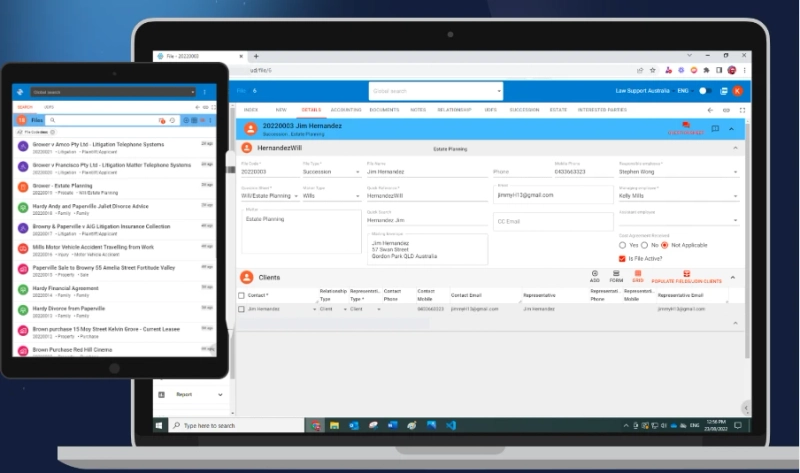In today's fast-paced legal industry, managing matter-related data can be a daunting task. Legal departments are now required to handle vast volumes of information, including contracts, litigation documents, and communication with clients. To streamline these processes and ensure efficient management of legal matters, many organizations have turned to Matter Management Software solutions. However, choosing the right software that meets your organization's specific needs can be overwhelming. In this blog post, we'll provide you with some invaluable tips on what to look for in a Legal Department Matter Management Software solution. By implementing these guidelines in your selection process, you'll stand a better chance of finding the best solution that perfectly matches your requirements!
What to Look for in a Matter Management Software
When choosing a Matter Management Software solution, there are several factors to consider that will help you make an informed decision. Firstly, the solution should be scalable and flexible, meaning it can grow with your organization as its needs evolve over time. This is particularly important for organizations looking to expand or add new practice areas.
Another essential aspect of a Matter Management Software solution is its ability to integrate with other systems such as billing software and document management solutions. Integration helps eliminate manual data entry errors and streamlines workflows between different departments within the organization.
The system's user interface should also be easy-to-use and customizable to meet your team's specific requirements. A simple but intuitive design saves valuable time on training staff members on how to use the software correctly.
An ideal matter management software system should have robust reporting capabilities that allow users to generate customized reports based on their unique requirements quickly. Reporting tools provide insights into key metrics such as task completion rates or financial performance, which can aid in strategic decision-making processes.
By taking these factors into account when selecting a matter management software solution for your legal department, you'll ensure seamless operations and efficient handling of all matters-related data!
Factors That Affect the Selection of a Legal Department Matter Management System
When selecting a matter management system for your legal department, it’s crucial to consider several factors to ensure that you’re making an informed decision. First and foremost, the system should be user-friendly and accessible to everyone in the department. This means that it should have an intuitive interface and provide easy access to information.
Another important factor is scalability. As your legal department grows or changes over time, you’ll need a system that can adapt accordingly without compromising functionality. It’s also essential to choose a system that integrates with other applications used within your organization.
Data security is another critical consideration when choosing a matteranagement software. Legal departments handle sensitive data daily, so it's imperative that any software chosen provides robust measures against cyber threats such as hacking and unauthorized access.
Additionally, cost-effectiveness is something else worth considering when selecting matter management software for your legal team. Factors like licensing fees or maintenance costs may vary depending on the provider of the software; thus, it's essential first to identify all relevant expenses before committing.
Ultimately, there are many different factors involved in choosing the right matter management software for your legal department - from ease-of-use and integration capabilities through data security concerns all down way down to price considerations - but by taking these into account carefully during selection process will help you make better decisions for both short-term needs as well as long-term goals alike!
How to Use a Matter Management System
Once you have selected the right matter management software for your legal department, it's time to learn how to use it effectively. The first step is to ensure that all necessary data and information are entered into the system accurately, including case details, client information, billing records, and deadlines.
Next, familiarize yourself with the different features of the software such as automated workflows and document management tools. Take advantage of these features to streamline your work processes and improve efficiency.
It's also important to keep track of your progress by regularly updating case statuses in the system. This will help you monitor deadlines and stay on top of pending tasks.
Don't forget about collaboration – utilize communication tools within the matter management software to share documents, notes or , other relevant information with colleagues or clients in a secure environment.
Make sure that everyone on your team is trained on how to use the system properly so that they can fully benefit from its capabilities. With proper usage training, Matter Management Software can be an indispensable tool for any legal department looking for more efficient workflows while providing better transparency over their workloads.
Conclusion
To sum up, choosing the right legal department matter management software is a crucial decision that requires careful consideration. The factors discussed above should guide you in selecting the most suitable solution for your organization's needs. A good matter management system can help streamline workflows, increase productivity and efficiency, reduce risks and errors, and enhance collaboration among team members.
The benefits of a well-implemented matter management system are numerous, but it all starts with selecting the right one for your legal department. With so many options available on the market today, taking into account key features such as centralized storage and security measures will ensure an effective selection process.
Investing in a quality legal department software can lead to significant improvements in your organization's overall performance while promoting better client service delivery. Remember always to keep user experience at the forefront of any purchasing decisions made.



